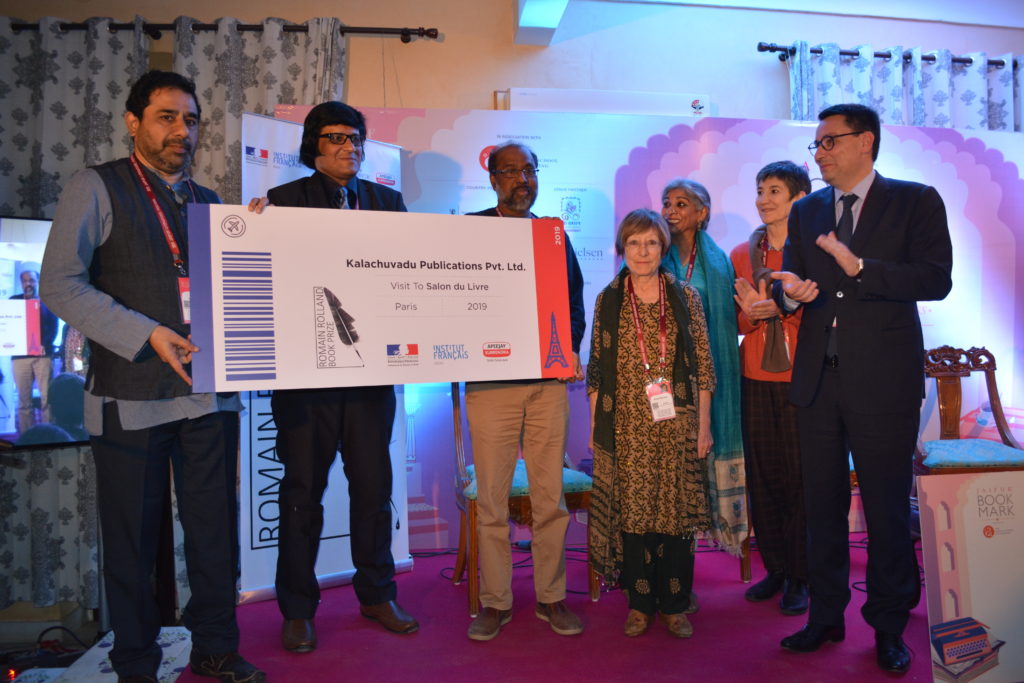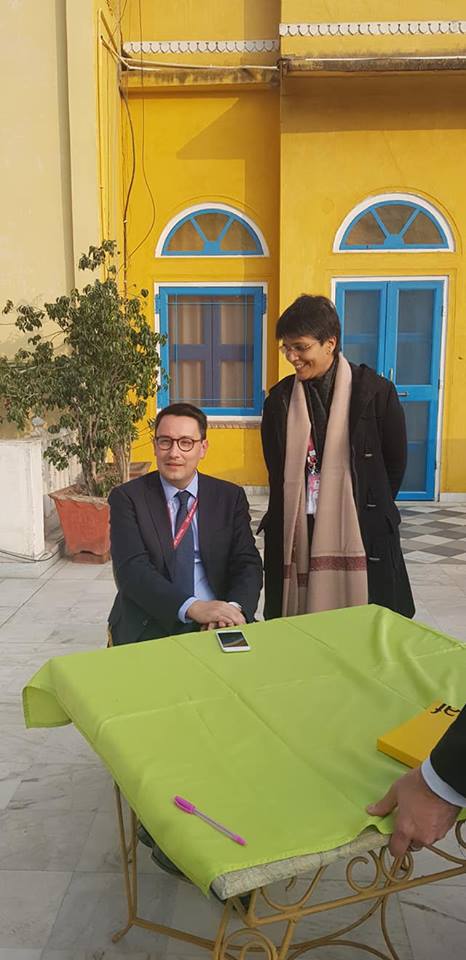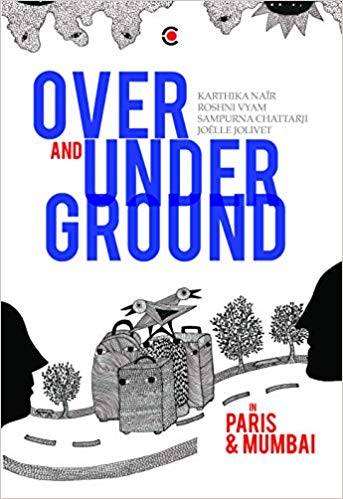Interview with Gaël Faye on his debut novel “Small Country”
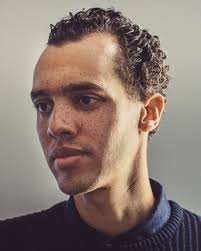
I read Gaël Faye’s book more than a year ago. Loved every word of it even though the story itself is horrific about the Rwanda genocide. The genocide began in April 1994 and lasted 100 days. Some 800,000 people, mostly Tutsi, were killed. Gaël Faye’s French-Rwandan wife’s Tutsi grandmother was also killed after taking refuge in a church. Small Country is a heartbreakingly painful story to read but it does not leave you in a hurry. It is magnificently translated into English by Sarah Ardizzone. For ever so long I had wanted to meet/interview Gaël Faye. In Jan 2020, Gael Faye was invited to attend the Jaipur Literature Festival. I did get the opportunity to meet him at the French Institute in Delhi. Unfortunately, due to a set of unusual circumstances I was caught in a traffic snarl and could not make it to the venue in time. Instead Isabelle Jaitly stepped in to interview Gael Faye on my behalf. She asked him the questions I had drafted and added some of her splendid ones as well. The interview was conducted in French since they are both fluent in the language. Isabelle has translated it from French into English. It has taken time as it is a long and complicated process. It involved first transcribing the interview from an audio recording and then translating it into English. The translation was also delayed by factors beyond our control — the Covid19 pandemic. It effectively forced the French government to cancel the Book Fair in Paris where India was going to be the guest of honour. Isabelle who works at the French Institute in Delhi was inundated with first the planning for the fair and then helping with the aftermath. It has been a surreal year. So I am truly delighted to publish on my blog this extraordinary interview with an extraordinary singer-cum-author and an extraordinary backstory!
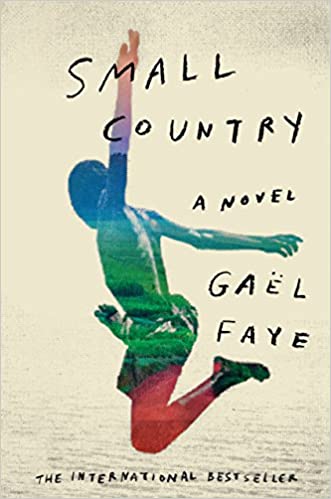
Gaël Faye is an author, songwriter and hip-hop artist. He released his first solo album in 2013, with his first novel following in 2016. Born in 1982 in Burundi to a French father and Rwandan mother, Faye moved with his family to France in 1995 after the outbreak of the civil war and Rwandan genocide. His debut novel Small Country was published to international acclaim. Written in French it has been translated brilliantly by Sarah Ardizzone. A lot must have been called upon her to invest in this translation. To delve into another language, capture the rhythms and transfer them seemingly seamlessly from the language of origin to the destination language is never an easy feat but Sarah has done it brilliantly. I do not know French but am familiar with it sufficiently to know the softness of the spoken word in French is very different to the cadences that English has to offer. I do not know how else to say it since I only know English. Yet, while reading Small Country I could not get over the fluidity of the prose. At times one forgets it is a translated text that one is reading.
Gaël Faye is a poet, rapper, musician, so rhythm probably comes easy to him. It is in all likelihood a part of his being, his DNA. Those who have music in them walk, talk and breath music and rhythms. If you witness such musically talented people, then it is pure joy to see them move and talk. Even an ordinary conversation with them takes on a precision that is delightful to experience. And somehow this oneness of spirit with music makes them seem like free spirits too. It conveys itself beautifully when such talented souls express themselves. Murakami says in his conversations Absolutely on Music that rhythm is important the text.
In the case of Small Country the boy-narrator comes across as a medium for sharing many of Gaël Faye’s own experiences or perhaps events he has witnessed. Using the fictional literary device tends to distance the author from the event. Yet using the first person to narrate events makes it so personal but also continues with the fictional deception of something so horrific. The only time the mask seems to fall is when the narrator recounts his mother’s witnessing of the murders in Rwanda. And that is not even a technique. It just comes across as someone who must at all accounts convey what his mother witnessed. In fact if you read transcripts of testimonies of women traumatised by conflict, the tone is this. The only difference is that while the mother in the book never really slips into the third person, all women survivors of a conflict situation always speak in the third person especially when they come to that particular point of describing the actual trauma. It is extraordinary but this is a fact that has been documented over and over again through decades of research on gender and conflict. While absorbed in the story the turn of events are not questioned even the deadpan monotone manner in which the mother tells her story at the dining table. Even her slow descent into a “madness” is done brilliantly. It is later upon closing the book that so many questions come to my mind. For instance, this eye-witness account has to be true. Probably the mother is an amalgamation of many such witness accounts or perhaps it is someone extremely close to Gaël Faye. Then I wondered how on earth did Gaël Faye capture this deadpan manner of narrating the genocide? Did he record it? Did he revise this portion? The translation too would have been tough leaving its mark on the translator. This is not a passage easily forgotten.
The fluidity of the prose is breath-taking. It is meditative so when the long passages on reading appear, the mind is sufficiently lulled to appreciate every moment of that experience…a trance-like space that seasoned readers will recognise. Then it is explosively disrupted with the accounts of lynching, the stench of death, hatred and sheer ugliness of the revenge violence unleased everywhere. It is frightening.
The maturity of the boy-narrator to express himself so clearly in his interior monologues can only come with time. A layered narrative if there ever was one. It is as if the adult-boy is reflecting back on the past without in any way undermining what he saw as a 10/11-year-old boy. It is a tough balance to achieve. But I often got the sense while reading Small Country how did Gael know when to stop layering the memories? My apologies for intermingling the fictional and the real experiences but there are some moments in the book that are too real to be ever imagined by a sane human being. The description of the mother coming upon the rotting bodies of her nieces and nephews that her hand goes through the pieces while she attempts to gather their remains for a decent burial. Once the book is read the images of the genocide and the slaughter of the crocodile for a birthday feast merge into one. I had a zillion questions for Gael. So when presented with an opportunity to interview him, I posed some of them.
Here are lightly edited excerpts of the interview conducted by Isabelle Jaitly and Jaya Bhattacharji Rose.
1. Why write a novel, rather than a long poem?
That’s a form I had never tried and I had been wanting to write a novel for a long time. And as I already write songs, which are for me some kind of poems, I felt there was a certain limit to this form. At the same time I imagine that this novel is in a way a long poem, because I tried to introduce poetry in it as much as I could, as indeed I try to put poetry in everything I write.
Was it unsettling going from a very constraining form to a very free form?
One has to find one’s bearing. I used some ‘devices’ to help myself in this. I wrote letters inside the novel; the narrator sends letters to someone and these letters acted in a way as milestones, which gave a sense of time and frame to the action. A little bit like rhymes in a song. That said, one never knows how to write a novel, it’s through trials and errors.
2. What do you prefer: prose or poetry?
It depends on the mood… I like to navigate from one to the other. But in a way, poetry is not a form in itself. Poetry can be found everywhere. There is such a thing as a prose poem! There is no tight limit, no frontier between the two.
3. Can reading a book change a person? How do you think your book may have impacted others?
Yes, a book can alter the way you see the world, alter things within oneself. I have been through it, and I imagine others have as well. About my book, it’s difficult to speak on behalf of my readers, but from what I have seen through the feedback I have got, it has helped many people unlock silences in their families, or admit things to themselves that they have been able to own, like the experience of exile, or a trauma from the war or genocide. I have received these kinds of feedbacks. In a lighter vein, many people have discovered a reality they had no idea about though my novel. I have received feedback from Afghan readers, from Iran. But not from India, and I am looking forward to it.
And you, have you ever been changed by a book?
Yes, and even by several books. One author who had a great influence on me is René Duprestre, from Haiti. I was overwhelmed when I started reading him. He was for me like a mentor, a sort of Pygmalion. Another book answered many questions I had in my childhood, about my metis, the book of ‘peau noire, masques blancs’ (Black Skin, White Masks) a book by Frantz Fanon, a writer from Martinique. it helped me come to terms with my origins without being in conflict with them. And the list can go on. I go on reading amazing books, which in a way change my outlook. But the books we read as teenagers have a very strong effect on us. As teenagers, we are in the process of being formed, so my strongest emotions as a reader happened during that time.
4. Was it difficult to write about the genocide?
Not really. I spend part of the year in Rwanda, I come from a family who went through the genocide, who are survivors. We live with this. And I find that my novel, on the contrary, considerably minimizes what happened. I didn’t open a wardrobe full of memories I wanted to forget. These are things with which I live, because around me the society lives with it, the society in Rwanda lives with the genocide. So the biggest difficulty for me was to make this part of history accessible to those who have not gone through it. So, in a way, to bring it to a universal level. And avoid thinking: this is a genocide that concerns a far away country in Africa, so it’s not my story, it’s not my business. I wanted to make this story a topic of discussion to anybody anywhere
5. What about the pain?
No, there was no pain. I am always surprised to see how people want it to have been painful. No, this is work, so there are days when it’s harder than others, but not emotionally. It is painful for the narrator, but not for me, I am the writer! It is my job to make it feel real, to give the feeling that for the character, there are doubts, there is pain and suffering. But me, as a writer, I sit at my table, and some days the writing comes easily, and I am pleased, and some days, I am depressed, because I haven’t been able to express my thoughts the way I wanted. This is the daily life of any writer. It may be surprising, but I wrote this novel with a lot of joy, a real lightness. Only one scene was difficult for me to write, and that is the scene of the mother being violent towards her daughter. It wasn’t easy, this scene, because I have children, and somehow I did a transfer, of a parent hitting their child, and that was probably the hardest scene. Of course the scene of the mother who comes back from Rwanda and, sitting at the table with her family, tells about what she has seen there, that was not easy, but here again, it so much falls short of what really happened, of what I hear everyday, of the story told by those who have survived, that, in the end, writing about it was not as hard as one could think. The hardest for me is to find the form through which to express all this. The ideas are there. There are so many topics I want to write about in my songs, in novels. but the hardest for me is to find the angle, the right angle. And this, you can not learn, you have to try out, and that’s always the hardest thing, whether you write a song or a novel. Let’s say, I want to write about peace: It’s so cliché, everyone has written a song about peace! But actually, nothing is ever cliché, you just have to find the right angle. Same about love.
So what may be surprising here is to see that this novel is not an autobiography, it is a novel. Although the title Small Country refers to one of your most popular songs, “Petit Pays”.
Yes, that’s right, it’s not an autobiography. But here again, it’s complicated… I think every novel is a form of autobiography. Here, there’s a great closeness between me and the character: his origins, the context in which he spends his childhood, what he goes through during his childhood, this time of war, and indeed I have gone through this myself, the transition from a time of peace to war… but if you go into details, what happens to him is not at all what happened to me. Of course I used my feelings at the time to write about him, but everyone does that when writing a novel. It’s a material, and everything becomes a material.
7. What prompted you to write this book?
First it’s the frustration of not being able to put all this in a song. I wrote a song called ‘L’ennui des après midi sans fin’ (‘The boredom of never ending afternoons’), which was very long, with a long text, and I had the frustration of not having said everything: about childhood, about the time of insouciance. So that’s how I started the novel: I wanted to expand on this song. Then, there were the events, in my area of Paris, the attack against Charlie Hebdo. Suddenly, there were scenes of war in Paris. It took me back 20 years. Hearing the Kalashnikov, the atmosphere of fear, or terror even. I lived for two years in the war. So there was a feeling of déja vu, a feeling well buried which came back in the everyday setting of Paris, it was very strange. That also fed the desire I had to write about the cocoons one creates around oneself. In the novel, there is a space that is that of the impasse (dead-end). This is a symbolic space for me: it’s the space where one withdraws, a space which is a cocoon, and at the same time this space becomes a trap. So there’s a swaying between the two. And to me, life in France has this feature: a mix between the cocoon, the desire to see the world through an idealised typical image, as if everything is fine and going well. It creates a distance with the world and its violence. At the same time, the world and its violence catch up, because there is no frontier between human interactions, and a conflict that happens at the other end of the world can impact France. So there was this ambivalence. And this child, in the novel, finds himself in this desire to create a distance between him and the violence around him.
8. Why do you use a child, a boy-narrator, as a literary device? Does it make it any easier to cross boundaries within a disintegrating society and offer multiple perspectives that only a child can offer –more or less without judgement?
This too was through trial and errors. At the beginning, I wrote the novel through the voice of an adult, and actually this voice still comes through here and there. Finally, I chose the voice of the child. It gave me an angle, because it allowed me to unfold the story through the eyes of a character who doesn’t know the environment he is in, more than the reader. Adults tend to always be one step ahead. The child is innocent in the political environment; he will discover it at the same time as the reader. That allowed to be didactic without showing it. And it was essential for a story that speaks about a country, Burundi, about a history, the history of the Great Lakes region, that nobody knows anything about. This way, the character goes forward at the same time as the reader. This way I don’t have to explain and justify feelings and motives. Adults, especially on the issue of ethnicity, find reasons to explain even absurd situations. I liked the naive point of view of the child, who will ask questions, because he doesn’t understand, and actually there is nothing to understand, because it is absurd. This is what comes through at the beginning with the explanations about ethnicity being divided according to the shape of their noses. This is a reality. But it’s absurd of course Children don’t find excuses. They look at the world as it is.
Beforehand, I wasn’t conscious about it, but now, I am very aware of how much the reader looks for the writer in a book. It think it is a mistake (a flaw). Maybe it goes with the society we live in, where everyone stages himself, stages his life, this world of reality shows… for me, a novel is a novel, it’s a story. Whether the writer has lived this story or not, what matters is whether one is carried away, touched by the story. Being invented doesn’t, for me, affect the power of a story. But I do wonder… my book has been translated in more than 40 languages, I have travelled a lot, met a lot of readers, and this question keeps coming back.
10. If people believe so much that it happened to you, it’s a compliment to the power of conviction of your writing.
Yes, it maybe a compliment, but what if it hadn’t happened? What does it take away from the book? If everything had been invented from beginning to end, for me that wouldn’t take anything away from the book, from a story. Actually I am very shy about my life, I don’t share anything about it. Unless someone is an historic figure, like Mandela, or Martin Luther King, I don’t feel there is a point to write an autobiography, according to me at least. And real lives are always so much more complex that lives in novels. If I wrote about my life, nobody would believe me, because my life is 100 times more complex. A novel allows to give the broad lines, so that the reader can identify with the character or the story. Going into complexity, one looses the link we have with the reader. I believe this is the role of artists: what is the common denominator between human beings, that allows to bring human beings together. These are often banalities, such as love, friendship, hate, war, things that are experienced everywhere. The story has to be simple. If you go too much into complexities, you lose the distancing. And this is not what a novel is about; at least, it is my point of view.
11. With the intentional blurring of the lines between the lived and the fictional landscape, it becomes hard for the reader to separate the identities of the boy-narrator and the author. Why did you choose an opening to the novel with a bar scene, reflection and then a flashback to a conversation between father and son before plunging into a conversation? Why not begin the novel straightaway? Why the artifice? It is not as if it any way eases the shock and distress at seeing the violence erupt.
It is not a device. The voice of the adult at the beginning comes back at the end. I did it to speak about something that is close to my heart: the feeling of exile. If I had started with the voice of the child, this feeling would have not been there, and I wanted it to hang over the novel (suffuse?). I wanted it to be a novel about exile. Because I would never have written a book, if I had stayed in Burundi. I feel this very deeply. It is the distance with my country that allowed it. Actually, when I went to live in Rwanda, went back to the region where I spent my childhood, the writing dried up. I couldn’t write any more about the country, the environment: it was here, under my eyes, and I needed the distance. It’s like love letters. It fills a vacuum. Writing for me had this function for many years. So I wanted there to be a character that made the reader feel certain things. This character says things that are essential, for example about exile being a door that is left ajar. Saying that the exiled person is not the one who decides to leave, but the one who has to flee. Another important aspect is that we know, we guess from the beginning that this child is going to be confronted to war, and that either it will end badly for him, or he will have to flee. That’s what happens. But I wanted to show that the region I come from is not an open sky cemetery. Yes, there is war and violence, but life goes on. Businesses spring back on their feet, they go on. So it was important for me that the character should leave, and also come back. Africa is not a continent that the character leaves, and nothing else happens, it falls into oblivion. The link with one’s past is always there. So it was important for me to have this voice, this point of view too in the novel. It also shows, through this, what happens to a child who goes through all this, what kind of an adult he can become. If one stops at childhood, there is no hint about what this child may become later. And I am passionate about imagining the trajectory of people, where they come from and what they become. In my family, people have had incredible destinies. Born in a village, with nothing, they go on to live in world capitals, do long studies, get jobs. I am always fascinated to see how, in a few years, one can change one’s condition. So, emotionally, I find this interesting.
You say we can be changed by a book. What changes do you hope to see though this book?
My hope is simply to make life in Burundi human and tangible. It’s not just a statistic. Burundi, Rwanda, these are countries one only see through the prism of war and violence. So obviously the point of view is distorted. One cannot imagine that families there may live normal, simple, happy lives. There are no novels about Burundi. I certainly have never seen one. So this is like a manifest: we existed, we had simple, banal lives. I wanted to give it a voice. It’s not much, but it’s already something. I want to remove the exotic, the set images, set ideas. I am part of a new generation of writers writing about the region. And as such, we constantly have to go back to explain things from the beginning. We have to explain the history of the place, because it is unknown. When I got an award in 2016 from high school students (Prix Goncourt des Lycéens), many young people told me they didn’t know about the Great Lakes region. The hope is that one day we can write stories without having to go through this didactic process. I hope we will allow this to happen for the younger, next generation… They will be able to write about lighter, more banal stories, love stories, and science fiction.
12 Has the success of Small Country been paralyzing for you?
Writing has moments of epiphany, great joy, where I feel: this is why I write! But it is also great suffering. You have to give a part of yourself, to put part of yourself on the line. I need this to feel that the work is sincere. This is probably due to the fact that I started writing for reasons that were not light reasons: war, being a witness etc. So my pointer is always this: Am I being sincere? There is already so much noise on this planet, everywhere, non stop. Why add to it? I need to feel that my writing is not gratuitous. If I take the attention of people, it is to bring something to them, not to say, hello, I exist. It is so tempting today to exist just for existing. When we open a book, we try to create silence around us, in us. Great songs are the same for me. They bring you something that you can’t hear otherwise. The artist has to fight the urgency. We are pushed into it. But it’s like a child who needs nine months to be born. The artist needs a gestation period which cannot be dictated. It’s only an intimate feeling that can tell us that we are ready, we have found the right angle, the right voice. So I know that the process I am in at the moment, of writing a new novel, is complicated. There is an expectation: but that, I have to forget about. But mainly it is complicated because I want to put myself on the line. It’s fascinating, but it’s crazy, so much work! Put oneself on the line and at the same time remember that nobody is waiting for it, it remains something superfluous. Radicalism is dangerous. There is no radicalism; the most radical thing in the world is to find a balance — take it from a metis person!
17 April 2020


